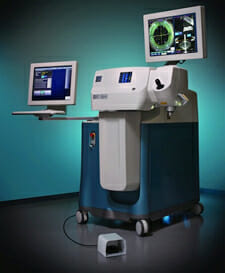Have you recently found out you have cataracts? Cataracts are highly prevalent and are considered an age-related eye condition.
They tend to affect adults over 40. How early they begin to develop varies.
But chances are, you’ll develop cataracts at some point in life. If you have cataracts, your next question may be when you should seek treatment.
Ideally, you should see your eye doctor regularly once you turn 40. Regular eye exams will ensure early diagnosis of your cataracts.
However, you may not need treatment immediately, even if you have cataracts. Cataract surgery is the only way to treat cataracts.
Laser cataract surgery is a more advanced variant of the procedure. Whether you have laser cataract surgery or the more traditional procedure, it’s only recommended once cataracts make it difficult to live your life and are significantly developed.
But how do you know your cataracts are advanced enough to undergo cataract surgery? Keep reading to learn more about how cataracts affect your vision, how you can tell when it’s time for surgery, and how laser cataract surgery can give you the best outcomes.
Cataract Symptoms

Cataracts form on the natural lens of your eye. When you have a cataract, the lens, which is usually clear, becomes cloudy.
Over time, the lens becomes cloudier and cloudier, making it harder and harder to see. At first, you may not even notice any visual symptoms since it can take years for cataracts to develop.
But when your cataracts become more advanced, you may experience symptoms like:
- Blurry vision
- Glare and halos around light
- Poor night vision
- Light sensitivity
- Decreased ability to see color contrast
- Noticing colors look muddier or faded
- Falling more because of impaired vision
- Needing more frequent prescription changes to your contacts or glasses
These symptoms are the leading indicators that you may have cataracts. It’s essential to realize that these symptoms are not exclusive to cataracts.
Seeing your eye doctor if you’re experiencing these signs is a good idea to determine their cause. If you have regular eye exams, your eye doctor can spot cataracts before they cause any symptoms.
This can be helpful as your ophthalmologist at Sierra Nevada Eye Center can monitor the progression of your cataracts and recommend treatment when appropriate.
Cataract Treatment
There’s only one way to treat cataracts, and that’s by undergoing cataract surgery. When you have cataract surgery, it completely removes your cataracts by removing the lens they’ve formed on.
After removing the lens, it’s replaced with an artificial lens called an intraocular lens. If you have cataracts, you may not need treatment right away.
Since cataracts can take years or decades to develop, cataract surgeons only recommend the procedure once your cataracts begin to affect your quality of life. But how do you know when your cataracts affect your quality of life?
How your cataract symptoms affect your life can be subjective. If you’re unsure, you can look for a few things that are clear signs that it’s time to begin considering cataract surgery.
Signs of Advanced Cataracts

If your cataract symptoms start getting in the way of completing everyday tasks, it’s a good indicator that they may be significantly advanced. Feeling like impaired vision is making it harder to live your life is a sure sign that it could be time for cataract surgery.
If you have advanced cataracts, you may have trouble reading unless you have a light directly on whatever you’re reading. You may find driving more challenging after dark because of your poor night vision and the blinding glare from headlights.
If you don’t even feel safe driving at night, that’s a sure sign that it’s time for cataract surgery. Another sure sign that it’s time to think about cataract surgery is if you injure yourself because you can’t see well due to your cataracts.
Of course, having your cataracts treated before that point is a good idea. If you haven’t had cataract surgery yet and you fall or get into an accident because of your cataracts, you should seriously consider having cataract surgery as soon as possible.
Having your cataracts removed will help you feel safer and more independent! Not to mention, you can look forward to crisper and clearer vision.
Laser Cataract Surgery
Cataract surgery is the most commonly performed medical procedure in the country. You’ll go home the same day it’s completed, as cataract surgery is an outpatient procedure.
Traditionally, when you have cataract surgery, your cataract surgeon uses a small blade to create an incision in your eye to access your lens. After accessing the lens, they break it up and remove it through the incision.
Then the artificial lens that replaces your natural lens, an IOL (intraocular lens), is folded and inserted through the incision, unfurled, and positioned inside your eye. Traditional cataract surgery is a low-risk procedure with generally good outcomes.

But laser cataract surgery has even better outcomes because it eliminates human error. Instead of using a blade to make the incisions, your cataract surgeon uses a pre-programmed femtosecond laser.
The femtosecond laser creates incisions and even softens the lens to make it easier to break apart. Using the laser for these incisions ensures that they are precise and that less tissue is disturbed, leading to a more straightforward healing process with fewer risks for complications.
If you want to get the most out of your cataract surgery, laser cataract surgery is the way to go. When your cataracts begin interfering with your quality of life, don’t wait.
Talk to your eye doctor about cataract surgery. If you’re looking for a practice that offers laser cataract surgery, make an appointment today at Sierra Nevada Eye Center in Carson City, NV, to talk to one of our cataract specialists.
Haven’t cataracts had control of your vision for long enough? Take back control by choosing laser cataract surgery!


